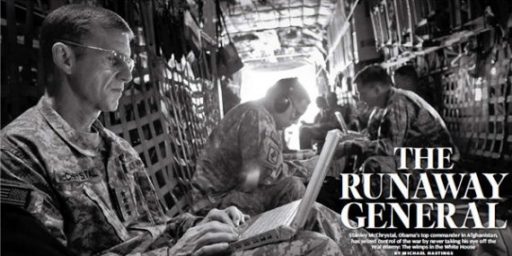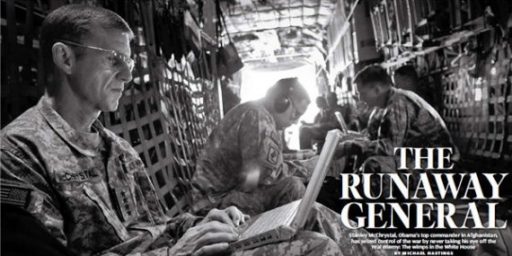Journalist Michael Hastings Dead at 33
Michael Hastings, a journalist who vaulted into notoriety with an article about General Stanley McChrystal’s tenure as head of allied forces in Afghanistan, has sadly passed away at far too young an age:
Michael Hastings, a contributor to Rolling Stone and BuzzFeed, died on Tuesday morning in a car crash in Los Angeles at the unforgivably young age of 33.
He is best known, rightly, for his 2010 Rolling Stone profile of Gen. Stanley McChrystal, who as commander of the U.S.-led force in Afghanistan was the face of the war that Hastings saw as misguided and poorly managed. His profile, “The Runaway General,” portrayed McChrystal as a loose cannon so sure of himself and his strategy for the war that he and his staff openly derided their civilian overseers, including Vice President Joe Biden.
President Obama dismissed McChrystal over his comments in the story, which also won several awards, as if Hastings needed a plaque to know that a piece of journalism that led a president to fire his top general was something special.
Hastings is today, and will likely continue to be, remembered as the journalist who brought down a four-star general and the face of the war in Afghanistan. But that story was just one piece of a remarkable but too-short career of speaking the truths that no one else was willing to, keeping his notepad open when others might have closed it, a refusal to play by the unspoken rules and a delightful disobediance to which we were all beneficiaries. He was never afraid to burn a bridge if he thought doing so might help him tell his readers something they needed to know.
But, for all his take-no-prisoners bravado, in my all-too-brief encounters with Hastings he was more thoughtful than he let on in public. After I wrote critically about his McChrystal profile, he reached out to offer a kind word and invite me to drinks, a small gesture but one that few writers – perhaps myself included – would have been generous and unguarded enough to make to a critic.
Rolling Stone put it this way:
Michael Hastings, the fearless journalist whose reporting brought down the career of General Stanley McChrystal, has died in a car accident in Los Angeles, Rolling Stone has learned. He was 33.
Hastings’ unvarnished 2010 profile of McChrystal in the pages of Rolling Stone, “The Runaway General,” captured the then-supreme commander of the U.S.-led war effort in Afghanistan openly mocking his civilian commanders in the White House. The maelstrom sparked by its publication concluded with President Obama recalling McChrystal to Washington and the general resigning his post. “The conduct represented in the recently published article does not meet the standard that should be met by – set by a commanding general,” Obama said, announcing McChrystal’s departure. “It undermines the civilian control of the military that is at the core of our democratic system.”
Hastings’ hallmark as reporter was his refusal to cozy up to power. While other embedded reporters were charmed by McChrystal’s bad-boy bravado and might have excused his insubordination as a joke, Hastings was determined to expose the recklessness of a man leading what Hastings believed to be a reckless war. “Runaway General” was was a finalist for a National Magazine Award, won the 2010 Polk award for magazine reporting, and was the basis for Hastings’ book, The Operators: The Wild and Terrifying Inside Story of America’s War in Afghanistan.
For Hastings, there was no romance to America’s misbegotten wars in Afghanistan and Iraq. He had felt the horror of war first-hand: While covering the Iraq war for Newsweek in early 2007, his then-fianceé, an aide worker, was killed in a Baghdad car bombing. Hastings memorialized that relationship in his first book, I Lost My Love in Baghdad: A Modern War Story.
A contributing editor to Rolling Stone, Hastings leaves behind a remarkable legacy of reporting, including an exposé of America’s drone war, an exclusive interview with WikiLeaks founder Julian Assange at his hideout in the English countryside, an investigation into the Army’s illicit use of “psychological operations” to influence sitting Senators and a profile of Taliban captive Bowe Bergdahl, “America’s Last Prisoner of War.”
“Great reporters exude a certain kind of electricity,” says Rolling Stone managing editor Will Dana, “the sense that there are stories burning inside them, and that there’s no higher calling or greater way to live life than to be always relentlessly trying to find and tell those stories. I’m sad that I’ll never get to publish all the great stories that he was going to write, and sad that he won’t be stopping by my office for any more short visits which would stretch for two or three completely engrossing hours. He will be missed.”
There were many criticisms of Hastings and his piece about McChrystal’s tenure, but there doesn’t seem much doubt that what he reported on was accurate. In any case, it’s always sad to see someone with a promising career taken away by something as random and meaningless as a car accident.






@Doug Mataconis
His refusal to behave obsequiously to power made him so interesting, given how extraordinarily rare such a temperament is. With him the mission (adversarial journalism) always came first and he’ll be impossible to replace.
John Cole said it perfectly http://www.balloon-juice.com/2013/06/18/and-steve-doocy-will-probably-live-forever/
He will be missed – one of the few “real” journalists out there. Truth to power-few reporters are willing to do that anymore.
something is awful suspect about this one.
@Patrick in Michigan:
9/11 was a hitjob on Barbara Olson.
….
There are events where people die.
There are people who are more well known than the rest of us.
Sometimes, people who are more well known than the rest of us are involved in events where they die.
@Patrick in Michigan:
He died in a car crash in Los Angeles, this is not exactly an occurrence that calls into question an explanation of a fatality in Los Angeles.
@al-Ameda:
It’s not that it was a car crash per se. It’s the particular details. He was the only one in the car, he was driving at high speed, and his car jumped the median, crashed into a tree, and apparently burst into flames. His body was burned beyond recognition; the police had trouble initially identifying him.
In my mind, that does raise questions.